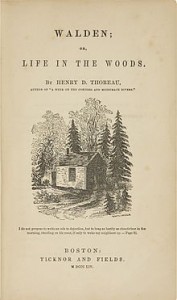Planet Earth — Walden’s Climate Change 1852 to 2015
From an Article by Rachel Hartigan Shea, National Geographic Magazine, July 2016
“I am on the alert for the first signs of spring,” wrote Henry David Thoreau. The author of the book Walden; Life in the Woods recorded first flowering times from 1852 to 1858 for more than 300 plant species in Concord, Massachusetts. During his daily wanderings through the field and forest, he also noted when migrating birds returned, when leaves burst forth on trees, and when the ice melted on Walden Pond.
Some 160 years later, Richard Primack, a biologist at Boston University, is using Thoreau’s handwritten data to track how the climate has changed in this historically significant corner of New England. In 2004 Primack and his students began scouring Concord for first flowerings. “We didn’t know where to look,” says Primack, until they learned Thoreau’s trick of seeking early blooms in areas of human disturbance. The 19th-century thinker found his quarry along railroad tracks; Primack and his crew had luck near Walden’s parking lot.
The data on first flowering show that three wildflower species are blooming later while 29 species are blooming earlier. Thoreau’s data are from 1852 to 1858 while the Boston University observations cover 2004 to 2015. Among Thoreau’s blooms were the pitcher plant, bluet, sheep laurel and pink lady’s slipper.
Primack’s ongoing study confirms that a warming climate – Concord is up 5 Fahrenheit degrees – is hastening the signs of spring. Walden’s ice breaks up and many plants bloom at least two weeks earlier than in Thoreau’s day, while leaves emerge on trees 18 days earlier. Only the migrating birds return roughly the same time.
How will this confluence of change alter the local ecosystem? To know that, Thoreau noted, one would have to “anticipate … Nature herself!”
See also:
1. /2013/03/08/new-phenology-study-documents-climate-trends/
2. /2013/08/22/what-insects-can-tell-us-about-climate-change/

